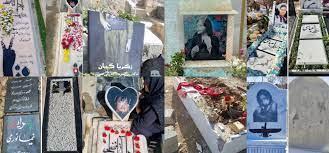
https://www.amnesty.org/en/latest/news/2023/08/iran-respect-families-rig...
In new research published today, Amnesty International details how the Iranian authorities have been subjecting victims’ families to arbitrary arrest and detention, imposing cruel restrictions on peaceful gatherings at grave sites, and destroying victims’ gravestones. Not a single official has been held to account for the unlawful killing of hundreds of men, women and children by security forces during the authorities’ brutal crackdown on the popular uprising that engulfed Iran following the death in custody of Mahsa/Zhina Amini on 16 September 2022. Amnesty International considers the mental pain and anguish inflicted on mourning families by the authorities’ abusive practices to be a violation of the absolute prohibition on torture and other cruel, inhuman, and degrading treatment under international law.
“The cruelty of the Iranian authorities knows no bounds. In their sinister attempt to cover up their crimes, the authorities are compounding the anguish and suffering of victims’ families by preventing them from demanding justice, truth and reparation or even planting flowers at their loved ones’ graves. As the anniversary of the uprising nears, victims’ families fear that the authorities will deploy their usual repressive tactics to bar them from holding commemorations,” said Diana Eltahawy, Amnesty International’s Deputy Regional Director for the Middle East and North Africa.
“The international community must support victims’ families by pressing the Iranian authorities in private and in public to respect their right to freedom of expression, association and peaceful assembly. The families must be protected from arbitrary detention, threats and other reprisals. States must also call on the Iranian authorities to release all those who were detained for advocating for truth and justice over the deaths, quash all unjust convictions and sentences against them, and drop all charges against those facing reprisals for speaking out.”
Amnesty International has documented in its latest publication the cases of 36 victims’ families from 10 provinces across the country who have been subjected to human rights violations in recent months. They include families of 33 individuals who were unlawfully killed by the security forces during the protests; families of two individuals who were arbitrarily executed in connection with the protests; and family of one torture survivor who committed suicide upon release from detention.
Human rights violations against families for seeking justice, truth and reparation
The violations inflicted against victims’ families include arbitrary arrest and detention; unjust prosecutions on vaguely-worded spurious national security charges, which, in some cases, led to prison and flogging sentences; summoning and subjecting them to coercive interrogations by prosecutors or security forces; putting them under unlawful surveillance; and destroying or damaging the graves of their loved ones.
In July 2023, the mother of 16-year-old Artin Rahmani, who was shot dead by security forces on 16 November 2022 in Izeh, Khuzestan province, said on Twitter: “The authorities of the Islamic Republic killed my innocent son, imprisoned my brother and relatives, and summoned me to the prosecutor’s office for the crime of seeking justice for the killing of my child to silence me. Citizens in Iran have no right to protest and any efforts to seek freedom are suppressed with great violence”.










Add new comment